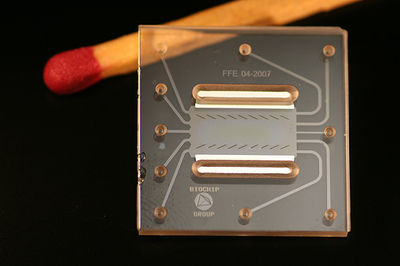Microfluidics: Difference between revisions
m (moved Low-Cost Diagnostics to Microfluidics) |
No edit summary |
||
| Line 1: | Line 1: | ||
{{Category=Health}} | |||
{{Category=Pests and weeds}} | |||
[[File:Microfluidic01.jpg|400px|thumb|right|Microfluidic Chip]] | [[File:Microfluidic01.jpg|400px|thumb|right|Microfluidic Chip]] | ||
| Line 10: | Line 12: | ||
==Applications== | ==Applications== | ||
* medicine: immediate testing ("point-of-care"), genetic testing and research, pathogens | * medicine: immediate testing ("point-of-care"), genetic testing and research, pathogens | ||
* agriculture: plant breeding, pests (genetic testing), nutrition | * agriculture: plant breeding, pests (genetic testing), nutrition. [[Controlled-environment growing]] can uses micrfluidic chips to monitor for DNA snippets associated with plant diseases. | ||
* environmental sensing: water testing, air quality, toxins | * environmental sensing: water testing, air quality, toxins | ||
* geoscience: soil science, [[Micromining|mining]] | * geoscience: soil science, [[Micromining|mining]] | ||
| Line 28: | Line 30: | ||
* Wikipedia: [http://en.wikipedia.org/wiki/Microfluidics Microfluidics] and [http://en.wikipedia.org/wiki/Lab_on_a_chip Lab-on-a-chip] | * Wikipedia: [http://en.wikipedia.org/wiki/Microfluidics Microfluidics] and [http://en.wikipedia.org/wiki/Lab_on_a_chip Lab-on-a-chip] | ||
* [http://diybio.org/ DIY Bio] | * [http://diybio.org/ DIY Bio] | ||
Revision as of 16:13, 16 February 2011
Main > Food and Agriculture > Pests and weeds
Analytical devices can be produced at very low cost from simple materials. Applications are as vast as they are revolutionary, and include medical tests, environmental sensing, agriculture, soil science and many more. Microfluidics refers to a set of technologies that control the flow of minute amounts of liquids or gases — typically measured in nano- and picoliters — in a miniaturized system. With these "chips", room-sized diagnostic testing equipment can be shrunk down to the size of a postage stamp. This is also called "lab-on-a-chip".
Materials and Equipment Used
consumables: blotter paper, regular paper, wax paper, shrinky-dink, transparency film, cotton thread, sewing needles, wood sticks, Jell-O, ?beeswax?,
equipment: syringes, cell phone cameras, plastic lenses for cheap microscopes,
Applications
- medicine: immediate testing ("point-of-care"), genetic testing and research, pathogens
- agriculture: plant breeding, pests (genetic testing), nutrition. Controlled-environment growing can uses micrfluidic chips to monitor for DNA snippets associated with plant diseases.
- environmental sensing: water testing, air quality, toxins
- geoscience: soil science, mining
- materials: chemical separation and reactions
- energy: development of biofuels
George Whitesides, Harvard University
In his legendary career in chemistry, George Whitesides has been a pioneer in microfabrication and nanoscale self-assembly. Now, he's fabbing a diagnostic lab on a chip.
Further Reading
- Disposable microfluidic devices created using regular wax paper
- Shrinky Dink® microfluidics - academic paper here
- Wikipedia: Microfluidics and Lab-on-a-chip
- DIY Bio
